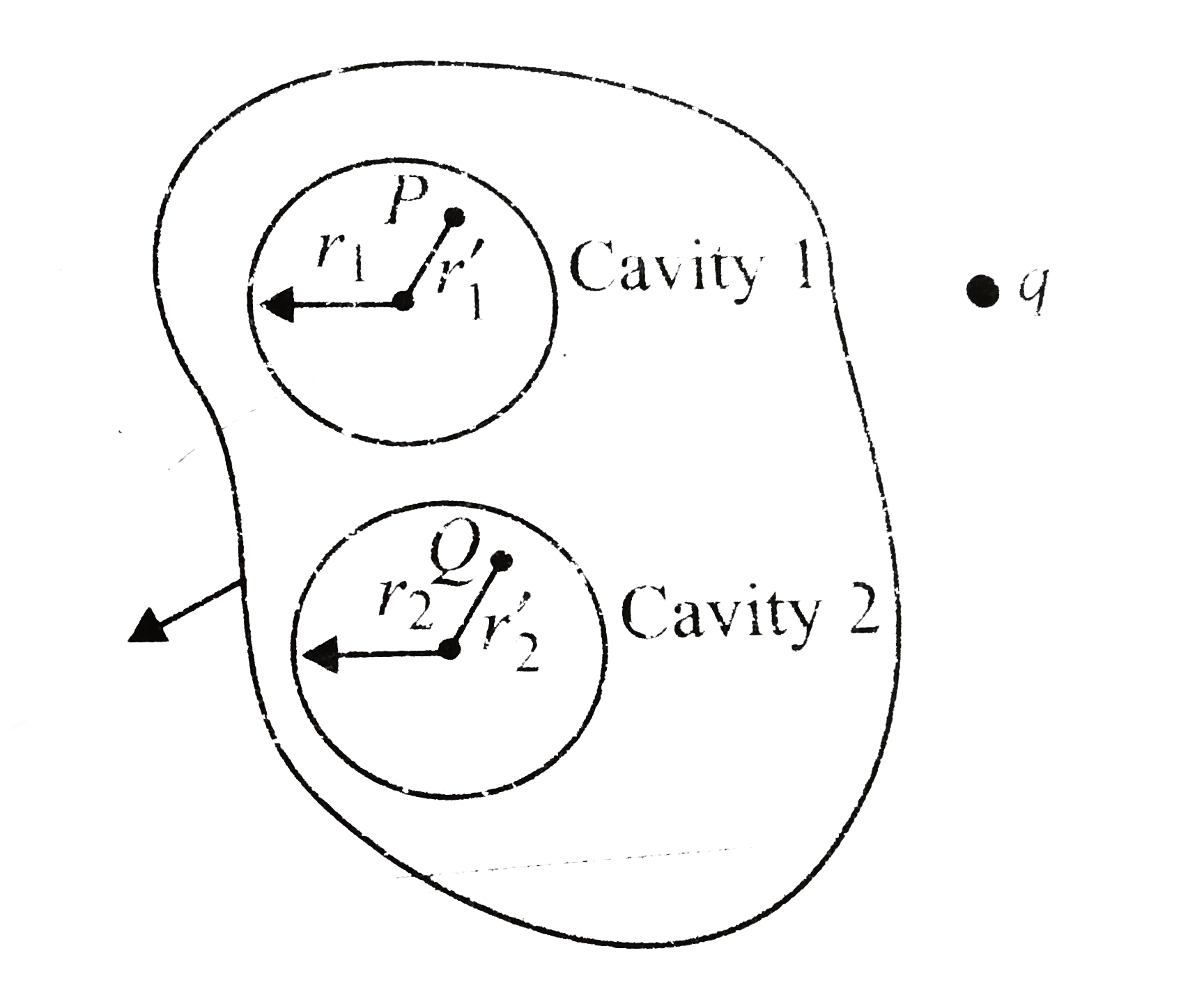A point charge is placed inside cavity 1 and another point charge is inside cavity 2. A point charge q is placed outside the conductor. For the situation described above, answer the following questions.
inside the conductor at point S distant r from point charge q, due to charge on outer surface of the conductor, would be
away from charge q
towards charge q.
zero
cannot be determined
The correct Answer is:B
inside the conductor due to outside charges
ltbr> Or toward q

Topper's Solved these Questions
- MISCELLANEOUS VOLUME 3BOOK - CENGAGE PHYSICSCHAPTER - MISCELLANEOUS VOLUME 3EXERCISE - Interger Answer type
20 Videos
- MISCELLANEOUS VOLUME 3BOOK - CENGAGE PHYSICSCHAPTER - MISCELLANEOUS VOLUME 3EXERCISE - Fill in the blanks
10 Videos
- MISCELLANEOUS VOLUME 3BOOK - CENGAGE PHYSICSCHAPTER - MISCELLANEOUS VOLUME 3EXERCISE - Assertion and Reason Type
8 Videos
- MECHANICAL PROPERTIES OF SOLIDSBOOK - CENGAGE PHYSICSCHAPTER - MECHANICAL PROPERTIES OF SOLIDSEXERCISE - Question Bank
4 Videos
- MISCELLANEOUS VOLUME 5BOOK - CENGAGE PHYSICSCHAPTER - MISCELLANEOUS VOLUME 5EXERCISE - Integer
12 Videos
Similar Questions
A point charge q1 is placed inside cavity 1 and another point charge q2 is inside cavity 2. A point charge q is placed outside the conductor. For the situation described above, answer the following questions.

The charge on outer surface of the conductor would be
View SolutionA point charge q1 is placed inside cavity 1 and another point charge q2 is inside cavity 2. A point charge q is placed outside the conductor. For the situation described above, answer the following questions.
If charge q2 is at point Q (inside cavity 2), then →E at the center of cavity 2 due to induced charge on the surface of cavity 2 would be
View Solution
Knowledge Check
A point charge q1 is placed inside cavity 1 and another point charge q2 is inside cavity 2. A point charge q is placed outside the conductor. For the situation described above, answer the following questions.

The charge on outer surface of the conductor would beAQ+q1+q2 and nonuniformly distributedBQ+q1+q2 and its uniform or nonuniform distribution depends upon locations of q1andq2CQ+q1+q2 and would be distributed uniformlyDQ+q1+q2 and the distribution depends upon the locations of q1,q2,andq.A point charge q1 is placed inside cavity 1 and another point charge q2 is inside cavity 2. A point charge q is placed outside the conductor. For the situation described above, answer the following questions.
If q1 is at the center of cavity 1, then →E at point S, at a distant r from the center of cavity 1(r>r1), due to the induced charge on outer surface of the conductor , would beAq1/4πε0r2 away from the center of cavity 1Bq1/4πε0r21 away from the center of cavity 1CzeroDq1/4πε0r2 toward the center of cavity 1A point charge q1 is placed inside cavity 1 and another point charge q2 is inside cavity 2. A point charge q is placed outside the conductor. For the situation described above, answer the following questions.
If charge q2 is at point Q (inside cavity 2), then →E at the center of cavity 2 due to induced charge on the surface of cavity 2 would beAq2/(4πε0r'22) toward q2Bq2/(4πε0r22) away from q2CzeroDcannot be determined
A point charge q1 is placed inside cavity 1 and another point charge q2 is inside cavity 2. A point charge q is placed outside the conductor. For the situation described above, answer the following questions.
If the potential of the conductor is V0 and charge q2 is placed at the center of cavity 2, then potential at point Q is
View SolutionA positive point charge q1 is placed at (a,0) and another positive point charge q2 is placed at (0,a) . Find the force acting on q1.
View SolutionA positive point charge q1 is placed at (a,0) and another positive point charge q2 is placed at (0,a) . Find the force acting on q1.
View SolutionA point charge q1 is placed inside cavity 1 and another point charge q2 is inside cavity 2. A point charge q is placed outside the conductor. For the situation described above, answer the following questions.
If the potential of the conductor is V0 and charge q2 is placed at the center of cavity 2, then potential at point Q is
View SolutionAt a point inside a charged conductor the
View Solution
